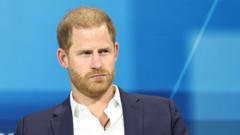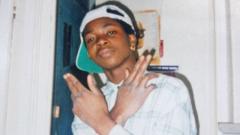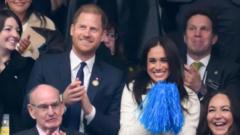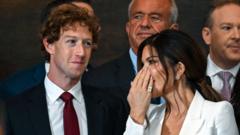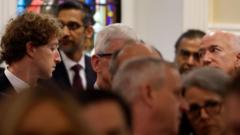Amidst ongoing legal proceedings, Prince Harry faces critical decisions surrounding a potential settlement with Rupert Murdoch's newspaper group, reflective of the prolonged phone hacking scandal that has shadowed Britain's media landscape.
Prince Harry's Legal Battle with Murdoch's Tabloids Postponed Again

Prince Harry's Legal Battle with Murdoch's Tabloids Postponed Again
Prince Harry weighs settlement offers as tabloid trial seeks resolution over phone hacking violations.
On January 21, 2025, the highly anticipated trial involving Prince Harry against Rupert Murdoch's News Group Newspapers experienced an unexpected delay. As the proceedings commenced, the judge was approached for a postponement shortly after, fueled by indications that the prince might be considering a last-minute settlement offer.
During the brief intermission, lawyers networked in the High Court’s hallways, where a throng of journalists gathered in anticipation of the case—a significant legal showdown pertinent to the phone hacking scandal that has plagued the UK's media ecosystem for over a decade.
Accepting a settlement could relieve Harry of substantial financial risks inherent in British law. Should the court rule against him, he could be liable for both parties' legal fees, potentially amounting to tens of millions of dollars unless he secures a sum at par with what Murdoch’s group was willing to negotiate.
For News Group, a settlement might eliminate the threat of exposing damaging evidence surrounding their reporters' alleged illegal practices, including phone tapping. The company, which has faced numerous similar claims and resolved them with hundreds of other complainants in the past, denies the allegations presented by Harry's legal team.
Judge Timothy Fancourt expressed hesitation yet ultimately consented to the adjournment, citing the benefits of additional time to seek a resolution. Legal representatives for Harry aimed to unveil a pattern of unlawful actions and a purported concerted effort to destroy emails that might implicate the media conglomerate in the scandal.
Critical questioning surrounded the absence of key figures in the proceedings, including James Murdoch and Rebekah Brooks, who played pivotal roles in the alleged cover-up. The absence of these witnesses raises questions about the adequacy of News Group’s defenses against the claims brought forth by Harry.
During the brief intermission, lawyers networked in the High Court’s hallways, where a throng of journalists gathered in anticipation of the case—a significant legal showdown pertinent to the phone hacking scandal that has plagued the UK's media ecosystem for over a decade.
Accepting a settlement could relieve Harry of substantial financial risks inherent in British law. Should the court rule against him, he could be liable for both parties' legal fees, potentially amounting to tens of millions of dollars unless he secures a sum at par with what Murdoch’s group was willing to negotiate.
For News Group, a settlement might eliminate the threat of exposing damaging evidence surrounding their reporters' alleged illegal practices, including phone tapping. The company, which has faced numerous similar claims and resolved them with hundreds of other complainants in the past, denies the allegations presented by Harry's legal team.
Judge Timothy Fancourt expressed hesitation yet ultimately consented to the adjournment, citing the benefits of additional time to seek a resolution. Legal representatives for Harry aimed to unveil a pattern of unlawful actions and a purported concerted effort to destroy emails that might implicate the media conglomerate in the scandal.
Critical questioning surrounded the absence of key figures in the proceedings, including James Murdoch and Rebekah Brooks, who played pivotal roles in the alleged cover-up. The absence of these witnesses raises questions about the adequacy of News Group’s defenses against the claims brought forth by Harry.









